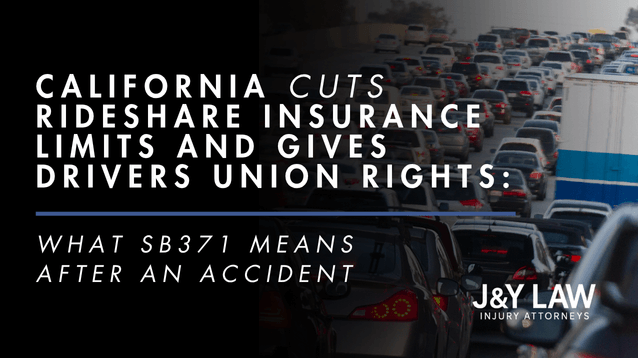California Cuts Rideshare Insurance Limits and Gives Drivers Union Rights: What That Means After an Accident
On October 3, 2025, Governor Gavin Newsom signed Senate Bill 371 and Assembly Bill 1340, reshaping insurance obligations and labor rights for Uber, Lyft, and other transportation network companies (TNCs).
Together, these laws drastically change how rideshare accidents are insured – and who pays when something goes wrong.
Here’s what you need to know, and what steps to take if you’re ever injured in a rideshare crash under California’s new rules.
What Does SB 371 Actually Change About Rideshare Coverage?
Senate Bill 371 (SB 371), authored by Senator Cabaldon, amends California’s Public Utilities Code to overhaul TNC insurance requirements. The goal, according to lawmakers, was to reduce costs for companies and reinvest savings into driver wages and rider affordability.
But for passengers and accident victims, the picture isn’t as bright.
For a free legal consultation, call (877) 735-7035
Key Insurance Changes Under SB 371
- Uninsured/Underinsured Motorist (UM/UIM) coverage during a ride is reduced from $1 million per person and $1 million per accident to just $60,000 per person and $300,000 per accident.
- The TNC itself, not the driver, must provide this coverage, and it must serve as primary insurance during a trip.
- Drivers’ personal policies may still apply, but TNCs can no longer delay or offset claims while verifying personal coverage – they are now required to act first.
- For Period 2 (when the app is on but no passenger is in the car), the new law adds a $200,000 excess policy on top of existing $50K/$100K primary liability limits.
- Property damage coverage during this period increases from $25,000 to $30,000 per incident.
These changes take effect contingent on AB 1340’s enactment by January 1, 2026.
Supporters claim the reduced coverage will make rides more affordable by cutting TNC costs. Critics argue it transfers financial risk from billion-dollar corporations to the passengers who can least afford it.
How Does AB 1340 Fit Into the Picture?
Assembly Bill 1340 complements SB 371 by granting rideshare drivers the right to unionize and collectively bargain, even while remaining independent contractors.
It establishes a certification process for driver organizations, requires TNCs to provide driver rosters to facilitate organizing, and protects drivers from retaliation.
Together, SB 371 and AB 1340 represent a legislative “package deal” – a negotiated compromise between TNCs, unions, and the state. The trade-off: driver rights expanded, but passenger protections weakened.
Click to contact our personal injury lawyers today
Why Are These Changes a Concern for Accident Victims?
The reduction in UM/UIM coverage – from $1 million down to $60,000 per person – raises serious concerns for injured passengers.
Under the new limits, a single emergency surgery can exceed available coverage. Victims may be forced to file multiple claims or rely on their own health insurance to fill the gaps.
Even though the law clarifies that TNCs must act as the primary insurer, meaning they can’t delay claims to verify a driver’s personal coverage, the total payout potential is now dramatically smaller.
“These laws were never about protecting everyday people,” says Jason Javaheri, Co-Founder and CEO of J&Y Law. “They were about protecting profits. Sure, maybe riders save a few bucks on their fare – but what happens to the person heading home from work who’s hit in a rideshare and can’t walk again? That $60K cap vanishes the moment the hospital door closes.”
Javaheri says the issue goes beyond dollars and cents – it’s about what kind of safety net our society is willing to provide.
“We’re talking about people whose lives are up-ended overnight,” he adds. “They shouldn’t have to start crowdfunding campaigns just to afford recovery. That’s not what our justice system was built on. Our society is supposed to protect those who can’t protect themselves – not make it harder for them to get help.”

Complete a Free Case Evaluation form now
Can These New Laws Affect Compensation in a Rideshare Crash?
Yes. The combination of lower coverage and new compliance rules will change how nearly every rideshare injury claim is handled.
- UM/UIM claims will shrink, meaning settlements may no longer fully cover medical bills or lost income.
- You’ll need to dig deeper into both the TNC’s and the driver’s insurance policies to uncover every possible source of recovery.
- Claims should now process faster, since TNCs can no longer delay payouts while “verifying” a driver’s personal policy. The TNC’s insurer must act as the first responder for coverage.
“The law is already complicated for most people,” Javaheri says. “Now, we’ve made it even harder. Instead of improving driver screening, addressing sexual-assault reports, or investing in safety, these companies pushed to cut coverage. That says everything about their priorities.”
He says the impact of these caps will be felt most by those who are already vulnerable – the people least equipped to absorb the fallout of an accident.
“We had a client with autism who was hit by a rideshare driver who didn’t take the time to understand what happened, they just drove off,” he recalls. “Our client is the person who will suffer because of these caps. And that’s exactly why we do what we do. We protect the little guy when no one else will.”
What Should You Do If You’re Injured in a Rideshare Crash Under the New Law?
If you’re hurt in an Uber, Lyft, or other rideshare vehicle, it’s more important than ever to act fast and document everything.
- Seek medical care immediately and keep every record.
- Save ride details: receipts, driver info, vehicle plate, trip logs.
- Photograph the crash scene, road conditions, lighting, and vehicle damage.
- Request the insurance disclosure that the TNC is now required to provide.
- Consult an attorney early. An experienced rideshare injury lawyer can identify every potential layer of coverage – including the new $200K excess policy for Period 2 – and ensure you don’t leave money on the table.
Because TNCs must now handle claims as primary, you should no longer experience the long verification delays that used to hold up settlements. But those faster claims won’t matter much if coverage caps are exhausted too soon, which is why having legal guidance matters more than ever.
If you or someone you love was hurt in a rideshare crash in California, call J&Y Law for a free consultation. We’ll walk you through the insurance changes, help you understand your rights, and build the strongest case possible under the new legal landscape.
Call or text (877) 735-7035 or complete a Free Case Evaluation form





